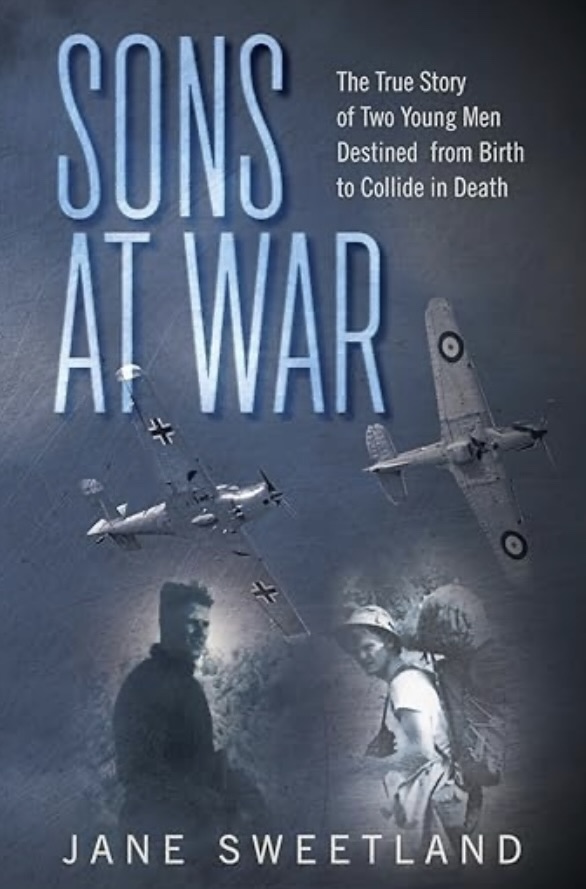THE STAGE 32 LOGLINES
Post your loglines. Get and give feedback.

SONS AT WAR BY JANE SWEETLAND AND TOM STOHLGREN
By Tom Stohlgren
Bound by privilege but divided by ideology, a German and an American boy become fighter pilots on opposite sides of WWII, hurtling toward a deadly aerial confrontation shaped by the worlds that raised them.
SYNOPSIS:
Author JANE SWEETLAND (70s) always knew the family story that her uncle TED SWEETLAND (24) and a German pilot, JOACHIM MÜNCHEBERG (24) shot each other down in World War II. But was it true? Through her investigation, which sent her to California, Germany and present-day Poland, she came to know the two men through their family scrapbooks, journals, and reporting by fellow airmen. Born six months and half a world apart they were privileged, lived in beautiful homes and played similar games like cowboys and Indians, as popular in Germany as in the U.S. In photos, they look like cousins.
The boys’ paths diverge as Adolf Hitler comes to power in Germany where teachers are agents of the state tasked with towing the Nazi party line. Jews are excluded and demonized; math problems include examples of how much it costs to care for the disabled; and in science, skulls and facial features are measured to determine if they fit the “Aryan” profile. Ted’s school environment is racially segregated by the social norms of the time, but in progressive classrooms there was room to question and challenge. Joachim’s late teenage years include pre-military training in Hitler Youth while Ted went backpacking in the high Sierras. In 1941, Ted studied philosophy in college while Joachim studied bullet trajectories in flight school.
Spurred by patriotism and duty, Ted and Joachim join their respective nations’ air forces. They were twenty-four years old when their stories collide in the skies over Tunisia. Both men are products of their upbringing, education, and the lessons their nation taught them. It’s a story for our modern age in a world in which nationalism is on the rise.
It is hard to imagine the deaths of young men and impossible to know exactly what happened in the air that day over Tunisia, but in his journal, Ted described a day he nearly died. “There was a feeling of suspension and extreme excitement mingled with mild anger. No heroics, no fear, no prayer, no time.” In those last few moments, we imagine their thoughts flickering to the ones who loved them—especially their mothers, who somehow never fully let go.

Rated this logline
Rated this logline
3 people like this
Thank you Harri-Pekka Virkki and Marcos Fizzotti . I was honored to help a grammar school classmate for 9 years, author Jane Sweetland, adapt her true story about her uncle to the screen.
3 people like this
Hi, Tom Stohlgren. This sounds interesting, but I think "history must remind us of the lessons denied to them by dying young" is vague.
2 people like this
Maurice Vaughan yes, a little vague like all biographies, authors have to infer the lessons in life from the dead -- in this case, from her uncle's death 75 years ago.
Rated this logline
2 people like this
Tom Stohlgren, this logline sets up a thoughtful and timely premise with strong thematic potential. The contrast between two boys growing up in very different political climates is compelling, and the commentary on learned ideology is powerful. That said, the logline reads more like a thematic summary than a pitch. To strengthen it, consider framing the boys’ parallel journeys around a central conflict or inciting event. What ultimately brings their stories together or pushes them into action? Anchoring the logline in a specific plot will help it resonate more clearly as a film or series.
1 person likes this
Thanks, Ashley Renee Smith for the helpful suggestions. We thought WWII would be a big enough "central conflict or inciting event." Maybe ending the logline with "before the pilots collide." What do you think? Or is that a spoiler?
1 person likes this
Ashley Renee Smith and Tasha Lewis 2 and Maurice Vaughan , I rewrote the logline -- I agree, it needed work. Ha! Always learning. Special Thanks for your help.
Rated this logline
Rated this logline
2 people like this
Maurice Vaughan and Tasha Lewis 2 Thanks for the lessons. I greatly appreciate you.
2 people like this
You're welcome, Tom Stohlgren. I'm looking forward to watching this!
Rated this logline
1 person likes this
Thanks, Jim Boston -- I had help -- a lot of help from the book author.
Rated this logline
1 person likes this
Thanks, Dwayne Williams 2.
Rated this logline
Thanks, Abdusamad Shafiev